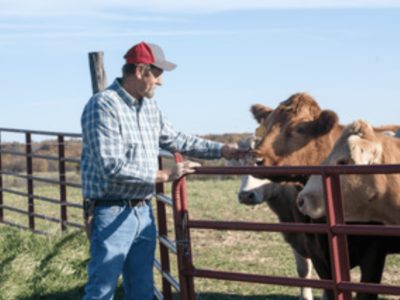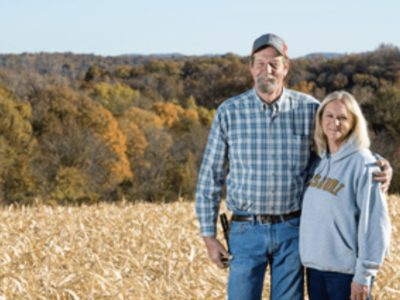Scherder family named recipients of Missouri Leopold Conservation Award by Missouri Farmers Care.
It may not be as famous for floating as Missouri’s Current River. And it may not draw anglers like the Jacks Fork, Niangua or Eleven Point rivers. But for John and Sandy Scherder of Frankford, Peno Creek is a special place.
Peno Creek is home.
Flowing north across Pike County in northeast Missouri, this spring-fed stream lies at the base of a picturesque backdrop of towering limestone bluffs. For generations, it has been the Scherder family’s backyard playground, where children and grandchildren splash in the clear, cool water, catching fish and frogs, and where the family finds respite along the bank while camping or cooking out.
For years, protecting Peno Creek and its watershed has been a priority for John and Sandy as they’ve earned a living raising both cattle and row crops. They’ve built their nearly 3,000-acre farming operation with sustainability in mind, adopting a philosophy of conservation that includes no-till farming, cover crops, variable-rate nutrient application and rotational grazing.
“Sustainable to me is keeping your resources intact,” John says. “You’re still making a living off the land, doing it at a profit, but yet you’re maintaining your resources as good or better than they were.”
The Scherders’ commitment to this philosophy has extended past the boundaries of their farm and has inspired others in their community to embrace conservation. For their efforts, they have been named winners of the 2018 Missouri Leopold Conservation Award, which recognizes extraordinary achievement in voluntary conservation. The award, which comes with a $10,000 prize, was announced in January at the 48th Missouri Governor’s Conference on Agriculture in Osage Beach, Mo.
“I guess you’d say we were kind of thrown into this,” says John, noting he was nominated by the Pike County Soil and Water Conservation District. “I do these things because they’re good for my farm and good for my family. I’m not one to go out and preach. I’m more or less doing it by show and tell. If what I’ve done convinces other people to do it, that’s good.”
Given in honor of renowned conservationist Aldo Leopold, the award provides a forum where farmers, ranchers and other private landowners are recognized as conservation leaders. Considered by many to be the father of wildlife management, Leopold was a forester, philosopher, educator, writer and outdoor enthusiast. His collection of essays, “A Sand County Almanac,” was published in 1949 and is one of the most respected and influential books about the environment ever written.
His namesake award has been presented annually since 2003 by the Sand County Foundation, which was established by a group of private landowners in 1965 to preserve the property north of Baraboo, Wis., where Leopold did his writing and research. The organization has since expanded to support and promote voluntary conservation on working lands across the United States, currently presenting the Leopold award in 14 states. Missouri Farmers Care, the Missouri Soybean Merchandising Council and the USDA Natural Resources Conservation Service partnered with the foundation to bring the Leopold award to the Show-Me State in 2017.
Among Leopold’s best-known ideas is the “land ethic,” which calls for an ethical, caring relationship between people and nature. Like many of those raised in agriculture, John grew up with such an ethic and knew from a young age that farming was his passion. After graduating from the University of Missouri in 1975, he began working with his father-in-law who ran a cow-calf and row-crop operation.
“I just always knew that’s what I wanted to do,” John recalls. “I think some people just have it in their blood. They want to be on the land and take care of the land and livestock. I think that was my calling.”
When he joined the operation, conventional tillage with moldboard and chisel plows was still common practice. They might sow clover into a field as a cover crop, but it would always get plowed under in the spring.
“I was not happy with the erosion issues; I just couldn’t handle it,” John says. “Your road ditch would be full of dirt. We had to do something better.”
John began using no-till practices and today, much of the operation’s acreage is in continuous no-till with minimal tillage on ground that is less susceptible to erosion. Working with NRCS, they’ve also established more than 150 acres of field borders that provide not only erosion protection, but also habitat for bobwhite quail, which the family enjoys hunting.
“Anyone who farms fields with trees around them knows that the outside of the field isn’t going to be as productive,” says John, who served on the Missouri Soybean Merchandising Council for 13 years. “That’s where the deer, raccoons and squirrels take their share and also where you’re going to have your most erosion. Putting the edges into CP33, it’s economically sensible plus it’s more sustainable and wildlife friendly. People complain that the outside didn’t make anything. Well, why keep farming that?”
With a “farm the best, leave the rest” mentality, the Scherders have established terraces and waterways and installed field tile to reduce erosion while making crop acres as productive as they can. Most recently, cover crops also have been incorporated into the farm’s management.
“It was probably an accident that I got started in the cover crops,” John says. “In 2012, the drought hit our area real bad. I had 30 acres of corn that wasn’t going to make anything, so we chopped it for silage to feed the cattle. Somebody suggested we plant cereal rye in that field. Well, we did, and thanks to some timely rains, we got a beautiful stand. That fall, we turned 40 cows in on it and got two months of pasture. I thought, ‘This is pretty good.’”
In the spring, John decided to let the rye grow with the intention of harvesting it for hay. With a little nitrogen, the rye took off.
“We mowed it and got 10 round bales to the acre,” he says. “We turned around and drilled beans in that field the next day, and we harvested 55-bushel beans that fall. We had no erosion, plus we got forage for the cows. I said, ‘Boy this thing is all right.’”
Since 2012, the Scherders’ cover crop acres have grown from those accidental 30 acres to about 900 acres in 2018. John’s advocacy for soil health and conservation has led him to host field days and demonstrations on the farm, as well as to become a driving force for the Peno Creek Cooperative Partnership, a farmer-led effort to protect the watershed the family holds dear.
Working with the Missouri Department of Conservation and the Farmers and Fishers Partnership, John and fellow farmers devised a program to provide a limited amount of cover crop seed to landowners within the watershed.
“In 2014, we had 13 landowners, and we seeded just shy of 500 acres,” John says. “Last year, we had 42 participate covering more than 2,000 acres.”
Chris Williamson, MDC fisheries management biologist, worked with John and the Peno Creek Advisory Council to make the cover crop program viable. He says John’s leadership and community involvement are impressive.
“Whether John is speaking about new conservation practices to area producers, or experimenting with different ideas, he is always looking for better ways of producing crops and cattle while maintaining his farm’s sustainability,” Chris says. “In my 20 years in the conservation field, I have not met a producer more dedicated to conservation.”
While they aren’t looking to retire any time soon, John and Sandy already are planning for the future of Scherder Farms. Their daughter, Holly, and her husband, Curtis, started farming with them about five years ago, and they have wholeheartedly embraced conservation.
“We have four children and 14 grandchildren,” John says. “Out of the 14, I hope to have one or two who want to come and farm, and when they do, I want what they’re starting with to be better than what I found. They don’t have to start behind the eight ball. Instead, they’ve got something to work with, something that’s sustainable, something they can take care of and be proud of and maintain for the next generation.”
Learn more about the Leopold Conservation Award at https://sandcountyfoundation.org/our-work/leopold-conservation-award-program.
- “Sustainaiblity to me is keeping your resources intact,” says John Scherder of his philosophy as he and his family farm in northeastern Missouri.
- John and Sandy Scherder



